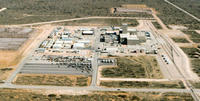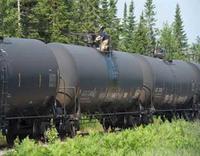-
Pressure grows for building a centralized nuclear waste repository
In 2010, after $9 billion and twenty-five years of construction, the Obama administration pulled the plug on the Yucca Mountain centralized nuclear waste repository. Toxic nuclear waste continues to accumulate on the grounds of U.S. nuclear power plants, with concerns growing about the security of keeping so may tons of such toxic materials in such a dispersed manner. Concerns have been heightened lately by the wave of closing, for economic reasons, of nuclear power plants, and worries about the safety of radioactive waste remaining behind on the grounds of shuttered plants. Senate Bill 1240 calls for the development of a Nuclear Waste Administrationto take responsibility for transporting and storing nuclear waste, and find the right geological location for a new centralized repository.
-
-
Cracked lid of a nuclear waste container may be source of WIPP radiation leak
The radiation leak at the Waste Isolation Pilot Plant (WIPP) near Carlsbad, New Mexico has been linked to a waste container shipped from Los Alamos National Laboratory (LANL), raising questions about the safety of other containers stored at the lab’s northern New Mexico facility and at the Waste Control Specialists (WCS) site in Andrews, Texas.As a precautionary measure, LANL has been ordered to remove thousands of similar containers filled with toxic waste from outdoor storage. Critics of nuclear waste storage practices have blamed the recent radiation accidents on a diminishing culture of safety at the fifteen-year-old WIPP.
-
-
Cesium chloride blood irradiators increase dirty bomb risk
Federal officials want to halt the use of blood irradiators used by hospitals and blood centers to ensure that blood is properly treated before transfusions occur. The irradiation devices contain cesium chloride, a highly radioactive powder which terrorists could use to make a dirty bomb. A 2008 reportby the National Academy of Sciences recommended stopping the licensing of new cesium chloride radiation sources, thereby encouraging the adoption of alternative sources with a less dispersible form of radioactive cesium, including cobalt-60 or X-ray irradiators.
-
-
Bill would encourage development of drugs to treat antibiotic-resistant bacteria
The U.S. Centers for Disease Control and Prevention(CDC) reported that two million Americans are infected by antibiotic-resistant pathogens every year, and the pathogens cause 23,000 deaths annually. In 1990, about twenty pharmaceutical companies had large antibiotic research and development programs, but today only three large firms and a few small companies are investing in antibiotic research. A new proposed bill, the Developing an Innovative Strategy for Antimicrobial Resistant Microorganisms Act, would encourage pharmaceutical companies to develop new drugs to treat antibiotic-resistant bacteria.
-
-
New Mexico demands clarifications, reassurances on WIPP radiation leaks

New Mexico’s environment secretary Ryan Flynn has ordered the Department of Energy (DOE) to explain how it will protect public health and the environment while it investigates a radiation leak at the underground Waste Isolation Pilot Plant (WIPP). The plant has not been in compliance with various permit requirements since the February underground fire and radiation leak, which eventually led to a plant shutdown.
-
-
U.S. to require railroads to notify states when oil is shipped

With the increase in available oil from fracking and larger pipeline capacity, railways are moving more and more oil. Rail companies moved 400,000 oil carloads in 2013, dwarfing 2005’s 6,000 oil carloads. The increase in oil shipments of oil has led to an increase in the number of accidents involving oil tankers. In the wake of recent accidents, the U.S. Department of Transportation (DOT) has released an emergency order to railroad companies which is designed to reduce the risk when shipping crude oil across the nation.
-
-
April storms lead to first billion-dollar losses of 2014

The outbreak of severe weather throughout the United States and other parts of the world in April will prove to have caused the largest economic losses since 2013, according to a report. During the month in the United States, at least 39 people were killed and 250 injured amid nearly 70 confirmed tornado touchdowns, which occurred across more than 20 states in the Plains, Mississippi Valley, Southeast, Midwest, and Mid-Atlantic.
-
-
Research reconfirms that public investment in scientific research promotes growth
New and independent research has reconfirmed and quantified some of the economic and societal benefits of public investment in scientific research. The report says that for every £1 spent by the U.K. government on R&D, private sector R&D output rises by 20p per year in perpetuity, by raising the level of the U.K. knowledge base.
-
-
Leaders of Chinese city delay alerting residents to deadly radiation risk
Authorities in the East China city of Nanjing delayed,for thirty-six hours, notifying residents about the loss of deadly isotope iridium-192 pellets at a local industrial plant. The pellets disappeared on Wednesday, and plant officials informed government authorities on Thursday – but did not inform city residents until Saturday. The extremely toxic pellets, the size of beans, were found the following Saturday in an open field one kilometer from the plant. The plant management detained four employees at the plant on Sunday for violating radioactive work regulations and storage rules, and they are likely to face criminal charges.The plant is using the isotope to find flaws in metal components.
-
-
Improving gloves to enhance first responders’ safety
Firefighters wear protective gloves called “structure gloves” to keep their hands safe on the job. The structure gloves currently used by firefighters, however, are not designed for the precision movements first responders must perform. There are many different types of structure gloves available, but none fully satisfies modern firefighters’ needs. Today’s compact tools often have small buttons that require nimble movements. Bulky gloves can make it difficult for firefighters to complete simple tasks without removing their gloves and compromising their safety. As advanced textile technology and materials continue to develop, the science behind firefighter structure gloves has adapted.
-
-
Limiting methane emissions would more quickly affect climate than limiting CO2
When discussing climate change, scientists point to “radiative forcing,” a measure of trapped heat in Earth’s atmosphere from man-made greenhouse gases. The current role of methane looms large, they say, contributing over 40 percent of current radiative forcing from all greenhouse gases. The role of methane as a driver of global warming is even more critical than this 40 percent value might indicate, they note, since the climate system responds much more quickly to reducing methane than to reducing carbon dioxide. The implication is that while it is true that in order to slow, or even reverse, global warming we must limit emissions of both carbon dioxide and methane, it makes more sense to concentrate now on limiting methane emissions because reducing methane emissions would buy society some critical decades of lower temperatures.
-
-
Behind the Boko Haram headlines, slavery in Africa is the real crisis
The mass kidnapping of schoolgirls by terrorist group Boko Haram in Nigeria is neither a new nor rare occurrence. Boko Haram has been active in Nigeria for five years and is just the tip of the iceberg when it comes to Africa’s slavery crisis. In Nigeria, there are tens of thousands of people bought and sold every year, according to Africa experts. The majority are children: in 2003, the International Labor Organization estimated that as many as six million Nigerian children had been trafficked at some time in their lives. In Africa as a whole, the scale of the problem is vast and far beyond the resources currently allocated to fight it, let alone sufficient to help victims. Experts estimate that $1.6 billion profit (an amount larger than the GDP of eight African countries last year) derives from African and Middle Eastern slavery annually.
-
-
Large areas of Plains states now drier than during Dust Bowl

As a result of the drought conditions that have largely remained a constant since 2011, parts of the Texas and Oklahoma panhandles, as well as northeastern New Mexico and southeaster Colorado, are now drier than they were during the infamous Dust Bowl of the 1930s. While experts explain that the possibility of another Dust Bowl is not likely due to modern farming and irrigation techniques which have been enacted as a response in the 1930s, greater erosion due to drought and wind has resulted in a number of vicious dust storms.
-
-
Bolstering shipping security
During a press conference following the March 2014 Nuclear Security Summit in the Hague, President Barack Obama noted that his biggest security concern was not Russia — or any other regional superpower — but rather “the prospect of a nuclear weapon going off in Manhattan.” Experts say that the most likely way in which a nuclear weapon would potentially come to a major U.S. city is not on the tip of a missile but in the belly of a ship, noting that this view has been openly validated by the intelligence community. In 2007, Congress passed a law requiring all overseas cargo containers to be inspected before they are loaded on a U.S.-bound ship. That law, however, has never been enforced.
-
-
Battelle shows smart technology for biodefense and hazard avoidance
Battelle last week announced production of the next generation chemical and biological hazard sensor system, which the company says operates at a fraction of the cost of current technologies. The technology, known as the Resource Effective BioIdentification System (REBS), is a battery-powered system capable of autonomous use with operating costs of less than $1 per day per unit (the company notes that current system costs that can range from $500 - $3,000 per day) and assay costs of $0.04 per sample (compared to current systems at over $100 per sample).
-
More headlines
The long view
Factories First: Winning the Drone War Before It Starts
Wars are won by factories before they are won on the battlefield,Martin C. Feldmann writes, noting that the United States lacks the manufacturing depth for the coming drone age. Rectifying this situation “will take far more than procurement tweaks,” Feldmann writes. “It demands a national-level, wartime-scale industrial mobilization.”
Trump Is Fast-Tracking New Coal Mines — Even When They Don’t Make Economic Sense
In Appalachian Tennessee, mines shut down and couldn’t pay their debts. Now a new one is opening under the guise of an “energy emergency.”
Smaller Nuclear Reactors Spark Renewed Interest in a Once-Shunned Energy Source
In the past two years, half the states have taken action to promote nuclear power, from creating nuclear task forces to integrating nuclear into long-term energy plans.
